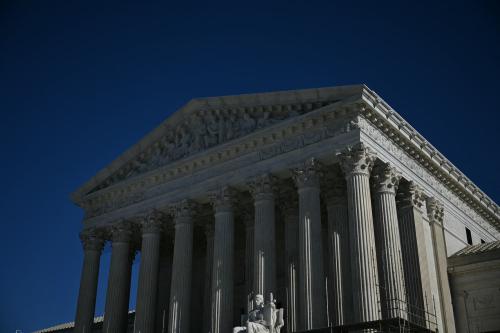In a surprising move, Egypt’s Muslim Brotherhood decided to field it’s own candidate, Khairat Al-Shater, for the presidency of Egypt, after months of insisting that it would not do so. Immediately, questions were raised about its credibility not only among its opponents but also among some of its supporters, many of whom opposed the move.
What explains this sudden reversal by a group that has been very calculating and careful in its political actions since the fall of Hosni Mubarak? The answer is: It found itself out-maneuvered by both the ruling Military Council and the surprisingly strong and more conservative Islamist competitors, the Salafis. And it stood to risk losing much of its gains.
The Brotherhood’s strategy has been clear. It looked ahead not only to winning control of the Parliament through its Freedom and Justice Party (FJP) but also to governing. From the outset, its leadership understood that the Egyptian public would ultimately judge it by how it performs once in leadership.
Above all, they understood the urgent economic rebuilding challenges that required internal and external stability in an environment where there is much international skepticism about the Brotherhood’s aims and capabilities. Much of what the Brotherhood has done in the early months was to assure domestic and international groups, from the Egyptian military, with whom it reached early tacit understandings, to the Egyptian Coptic Christian minority, to Western governments—and even to Israel.
Its view was clear: It preferred a strong parliamentary system in which it dominates with an internationally-respected president who is more liberal but is prepared to make a deal with them. They could be the kingmaker but not the king. For a while, it flirted with the idea of supporting former IAEA chief, Mohamed ElBaradei for president until the latter polled out of the race.
But two things happened that Brotherhood leaders didn’t anticipate. Following their parliamentary victory, their constituents were already judging them based on their performance, even though the Egyptian government in charge is outside their control and appointed by the military rulers. They became suspicious that the military and the interim government are deliberately acting to undermine their parliamentary credibility. The brotherhood’s Freedom and Justice party threatened to bring down the government through a parliamentary vote of non-confidence. The military council countered with its own threat of dissolving the parliament—something that’s allowed under the existing constitution.
This drove home the reality that the Brotherhood’s move to oppose revisiting the constitution before holding elections could come back to haunt them. The military threat to dissolve the parliament may have been a bluff. But what if an elected president who’s not a member of the Brotherhood acted on his own prior to constitutional revision?
Such a scenario has become more plausible in recent weeks as the field of presidential candidates expanded, despite the loss of some prominent potential candidates such as ElBaradei. When the Brotherhood looked around, the two leading presidential candidates were not to its liking. Former Arab League chief, Amr Moussa, who remains popular, is seen by the brotherhood as a threat to its control, and Hazem Abu Ismail, the Salafi candidate of the Nur party, who is a direct Islamist competitor to the Brotherhood, is seen to be so conservative as to lead Egypt into isolation.
The rise of the latter and his party has been the biggest surprise to almost all observers, including the Brotherhood. During the Mubarak era, the Salafis kept a relatively low political profile while being allowed by Mubarak security services to operate freely as a religious and social organization attracting funds from conservative religious groups and individuals from Arab Gulf states—probably as way of limiting the influence of the Brotherhood.
When Mubarak fell, everyone was surprised by the strength of the Salafis and their ability to translate their social and religious organizations into political clout. And while the chances of their presidential candidate seemed slim only weeks ago, the articulate Hazem Abu Ismail, has quickly risen to the top in the polls.
Given the fragmented field, it was no longer guaranteed that a liberal or moderate candidate would win simply by being endorsed by the Brotherhood. Some lacked international stature and significant Egyptian public support; others like Abd Al Monem Abul Futouh angered the Brotherhood by breaking from them to run for president, and had the Brotherhood endorsed him, he would have been counted as one of their own any way. By choosing one of their leaders to run for the presidency, the Brotherhood is betting that they will rally their supporters behind the nomination and hope to get a few more backers through coalition building.
But there are risks with this move, which is probably why the Brotherhood’s decision was far less from unanimous. The cost to their credibility is one problem. Egyptian public weariness of political dominance by any party may also work against them. Potential divisions within the Brotherhood’s own ranks is probably the biggest threat, especially if, the Islamists votes are fragmented and their candidate ends up losing. Welcome to the new Egyptian politics.
The Brookings Institution is committed to quality, independence, and impact.
We are supported by a diverse array of funders. In line with our values and policies, each Brookings publication represents the sole views of its author(s).



Commentary
Op-edThe New Egyptian Politics
April 4, 2012